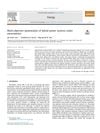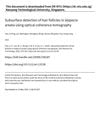 9 citations,
April 2018 in “Journal of Dermatological Treatment”
9 citations,
April 2018 in “Journal of Dermatological Treatment” Tofacitinib improves nail conditions in patients with severe hair loss and does not affect hair regrowth.
 8 citations,
October 2019 in “Immunological investigations”
8 citations,
October 2019 in “Immunological investigations” The AIRE gene variant rs2075876 is linked to a higher risk of alopecia areata in males.
 8 citations,
June 2019 in “Journal of Cosmetic Dermatology”
8 citations,
June 2019 in “Journal of Cosmetic Dermatology” Using a nonablative fractional laser with topical minoxidil can effectively and safely promote hair regrowth in alopecia areata patients.
 7 citations,
April 2021 in “British Journal of Dermatology”
7 citations,
April 2021 in “British Journal of Dermatology” Topical tofacitinib may effectively and safely regrow facial hair in some people with alopecia areata.
 7 citations,
January 2021 in “Dermatology and therapy”
7 citations,
January 2021 in “Dermatology and therapy” Both dermatologists and patients in Japan agree that treatment success for alopecia areata is having 20% or less scalp hair loss.
 6 citations,
August 2020 in “Dermatology and Therapy”
6 citations,
August 2020 in “Dermatology and Therapy” People with Alopecia Areata often have lower vitamin D levels, and vitamin D supplements might help treat it.
 6 citations,
March 2019 in “JAAD case reports”
6 citations,
March 2019 in “JAAD case reports” A new mix of anthralin and calcipotriene might help treat severe hair loss.
 5 citations,
February 2015 in “Endocrinology Diabetes and Metabolism Case Reports”
5 citations,
February 2015 in “Endocrinology Diabetes and Metabolism Case Reports” Insulin therapy helped a man with autoimmune issues regrow his hair.
 4 citations,
July 2020 in “Journal of Dermatological Treatment”
4 citations,
July 2020 in “Journal of Dermatological Treatment” Minoxidil injections can speed up hair regrowth in non-severe patchy hair loss, but combining it with steroids doesn't improve results.
 4 citations,
August 2019 in “Journal of Dermatology”
4 citations,
August 2019 in “Journal of Dermatology” The conclusion is that balancing cost and carbon emissions in hybrid power systems is crucial, especially when high reliability is needed, but the model needs to consider all device efficiencies and distribution losses.
 4 citations,
November 2018 in “JAAD case reports”
4 citations,
November 2018 in “JAAD case reports” Alopecia areata can sometimes appear as a straight line of hair loss instead of round patches.
 4 citations,
April 2020 in “JAAD case reports”
4 citations,
April 2020 in “JAAD case reports” JAK inhibitors help hair regrowth but not fully effective for androgenetic alopecia.
 4 citations,
April 2020 in “Journal of Cosmetic Dermatology”
4 citations,
April 2020 in “Journal of Cosmetic Dermatology” Low vitamin D levels are linked to different types of hair loss.
 3 citations,
September 2022 in “Archives of dermatological research”
3 citations,
September 2022 in “Archives of dermatological research” The fractional carbon dioxide laser is a safe and effective treatment for alopecia areata and works better than betamethasone valerate cream alone.
 3 citations,
January 2019 in “Annals of dermatology/Annals of Dermatology”
3 citations,
January 2019 in “Annals of dermatology/Annals of Dermatology” Hydroxychloroquine effectively treated twenty-nail dystrophy in a patient with alopecia areata.
 3 citations,
May 2018 in “Journal of Cosmetic Dermatology”
3 citations,
May 2018 in “Journal of Cosmetic Dermatology” Biopsy can differentiate between alopecia areata and androgenic alopecia, and if more information is needed, testing for CD3 and CD8 can help.
 2 citations,
August 2020 in “Journal of Cosmetic Dermatology”
2 citations,
August 2020 in “Journal of Cosmetic Dermatology” Higher granulysin levels in the blood are linked to more severe hair loss in alopecia areata patients, and these levels decrease after effective treatment.
 2 citations,
December 2018 in “Journal of cosmetic dermatology”
2 citations,
December 2018 in “Journal of cosmetic dermatology” Higher CRBP1 levels are linked to more severe alopecia areata.
 2 citations,
October 2023 in “Dermatology and therapy”
2 citations,
October 2023 in “Dermatology and therapy” Alopecia areata severely impacts quality of life, causing anxiety, depression, and work impairment.
 2 citations,
January 2022 in “Skin research and technology”
2 citations,
January 2022 in “Skin research and technology” OCT can detect hidden hair follicles in alopecia areata, indicating potential hair regrowth.
 2 citations,
January 2019 in “Annals of Dermatology”
2 citations,
January 2019 in “Annals of Dermatology” Certain gene variations in EGF and EGFR may increase the risk of alopecia areata in Koreans.
 1 citations,
October 2023 in “Dermatology and therapy”
1 citations,
October 2023 in “Dermatology and therapy” Some treatments for severe hair loss work but often have side effects, with baricitinib showing the most promise.
 1 citations,
October 2020 in “Journal of Investigative Dermatology Symposium Proceedings”
1 citations,
October 2020 in “Journal of Investigative Dermatology Symposium Proceedings” Platelet-Rich Plasma treatment improved hair growth and reduced inflammation in patients with patchy hair loss, but not in total hair loss, and Optical Coherence Tomography was useful in tracking this progress.
 1 citations,
July 2020 in “Journal of cosmetic dermatology”
1 citations,
July 2020 in “Journal of cosmetic dermatology” A woman on immunosuppressants developed two rare scalp conditions, which improved with specific treatments.
 1 citations,
July 2019 in “Clinical Rheumatology”
1 citations,
July 2019 in “Clinical Rheumatology” Leflunomide is more likely to help treat alopecia areata than cause it.
 June 2024 in “Dermatology and Therapy”
June 2024 in “Dermatology and Therapy” Baricitinib improves quality of life and reduces anxiety and depression in severe alopecia areata patients with hair regrowth.
 April 2024 in “Dermatology and therapy”
April 2024 in “Dermatology and therapy” There are significant gaps and inconsistencies in diagnosing and treating alopecia areata in Greece and Italy.
 March 2024 in “Journal of pharmacopuncture”
March 2024 in “Journal of pharmacopuncture” Hominis Placenta Pharmacopunture helped regrow hair in a patient with stress-induced hair loss.
 February 2024 in “Scientific reports”
February 2024 in “Scientific reports” Four genes are potential markers for hair loss condition alopecia areata, linked to a specific type of cell death.
 January 2024 in “Archives of dermatological research”
January 2024 in “Archives of dermatological research” Both treatments for alopecia areata showed similar modest effectiveness.






























